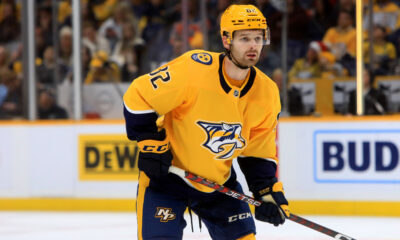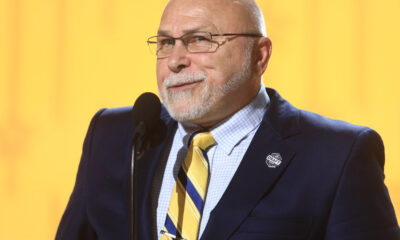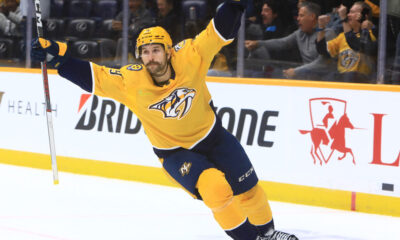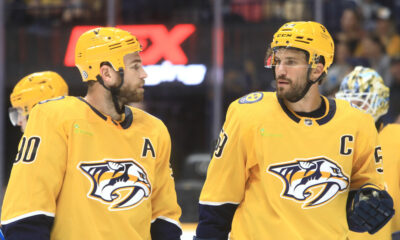Does that sound familiar? If not, I doubt you’ve been paying attention. Even if you’re lucky enough to avoid this mantra on a daily basis, it’s there. It lurks behind anonymous usernames, cartoon profile pictures, and thousands of keyboards. Chances are, if you’ve ever voiced concern over a player’s mental health, you have faced backlash for doing so.
Worse still, “hockey is a sport for men” is not limited to amateur voices. Media personalities on NBC, Sportsnet, ESPN, FOX Sports, and so on, will often chuckle as they make jokes about player suspensions and injuries. Don Cherry, Jeremy Roenick, Mike Milbury… these men have made their living on berating what they perceive as “weakness.” In doing so – by perpetuating this discourse – they are as guilty of injuring players as anyone on the ice.
Tom Wilson ended Zach Aston-Reese’s playoffs with an illegal check to the head. The hit left Aston-Reese with a broken jaw (which required surgery) and a concussion. Rightfully so, the NHL Department of Player Safety handed Wilson a three-game suspension. NBC’s thoughts, per their own Jeremy Roenick?
3 games? Maybe a little aggressive?
— Jeremy Roenick (@Jeremy_Roenick) May 3, 2018
In the hockey world, I’m nobody. Even so, dare I raise an ounce of concern about the severity of head trauma for hockey players? It will not go ignored.
“Snowflake”
“Bitch”
“Cry more”
Yes, I’ve heard it all. Want more examples? Venture into the comments section of any recent Daniel Carcillo Tweet.
If you’re still not content with your heart’s level of disrepair, search for Players’ Tribune articles by Nick Boynton, Marc Savard, Adam Estoclet, Bryce Salvador, and so many others. Then, don your HAZMAT suit and look at the comments.
In my opinion, there’s a single major reason athletes are not allowed to voice criticism: envy. Any of us sitting at our day jobs would, more than likely, switch roles with a professional athlete in a heartbeat. After all, these are games. Hockey is something you grow up doing with your friends, to escape “real life.” For a microscopic fraction of us, that game becomes “real life.” And, oh yeah, it pays pretty well.
Take the Washington Capitals. For the first time ever, they have won a Stanley Cup, arguably the most difficult and rewarding championship that exists. Watch the players’ faces as they lift the Cup. How many of us wish we could stand in their place? I certainly do.
This year, the #StanleyCup is #ALLCAPS. https://t.co/igkIzA9DCg
— NHL (@NHL) June 8, 2018
Surely, the elation of succeeding at the highest level, of realizing your wildest childhood dreams, towers above any discomforts that might be associated.
I’ll admit, I tend to think the same way. However, one particular passage in Nick Boynton’s “Everything’s Not O.K.” cemented my opposition to this idea.
“I honestly wish I would’ve retired when I was 26 or 27, even before I won a Stanley Cup… They can scratch my name off that cup, and I’d hand my ring back in right now if I could go back and make it so that I wouldn’t have had to experience all this pain and sorrow and anger and sadness.”
I read and re-read that passage a dozen times. Even in the most disturbing accounts of the damages of concussions for other NHL players, never once had I read such a frank statement of regret.
If Boynton feels this way, it’s safe to assume others do as well.
This fact alone, that players who have reached the pinnacle of professional sport, look back and regret the experience, is not insignificant. In fact, it suggests that a monumental shift is approaching. If the carrot begins to rot, the stick starts to hurt a lot more.
You have more power than you think. I understand that the NHL makes decisions behind closed doors and has a worrying PR problem. However, the consumer – that is, you and I, dictate the majority of the process. It’s a money game, and we’re the ones paying.
“The anguish of not knowing what was going to become of my life, and my identity, was worse than all the terrible headaches. The crushing anxiety that I experienced was worse than any broken bone.”
 If you’re someone who values the health of players, especially in terms of lasting mental and emotional health, you have my respect and my thanks. If you’re someone who worries that hockey will become less of a “game for men,” if emphasis is placed on protecting its participants, I hope you will at least consider the following:
If you’re someone who values the health of players, especially in terms of lasting mental and emotional health, you have my respect and my thanks. If you’re someone who worries that hockey will become less of a “game for men,” if emphasis is placed on protecting its participants, I hope you will at least consider the following:
NHL players are lucky. I’d imagine each and every one of them believes it.
NHL players are rich.
Is any of it worth hurting your family? Attempting suicide? Losing your children?
It really doesn’t take much for these consequences to be erased almost entirely, and the decision is ultimately ours.
“My mom comes down to check on me, and she sees that I’m in the middle of another impromptu mental breakdown. She knows there’s nothing she can do to help. She just sits next to me like moms always do, and she hugs me.
‘I’m sorry,’ I say. ‘I’m so sorry. I don’t know why this is happening.’”
We need to change the way we talk about head injuries, and it’s such an easy change to make. Read and understand the accounts of mental illness resulting from CTE. Get angry at a culture that threatens player livelihoods for speaking out. Challenge harmful rhetoric shared casually by media personalities. Break the cycle.
The blame is not on the players. With very few exceptions, even the hardest-hitting and meanest players hate every minute of the character they play on screen. Read John Scott’s book. Our perception of him was of a brutish monster. What we didn’t see is that he couldn’t sleep. For the majority of his professional hockey career, he lived in fear.
This is not the fear that should be celebrated when overcome; it should be erased altogether. It isn’t the butterflies before a playoff game. It’s the fear of deciding between your livelihood and your health. Your family and your job. Romanticizing that struggle is as damaging to every player as any elbow to the skull.
If you think I’m overreacting, here’s another excerpt from “Everything’s Not O.K.”
“I cannot, in good conscience, let [my son] play the game of ice hockey until something changes and we start looking out for our players…”
 “Hockey is a sport for men” will, if uncontested, destroy the sport itself. The game is getting faster, the players are getting bigger, and the hits are getting harder. Retired players are hesitant to even allow their kids the opportunity to follow in their footsteps. Simply put, the costs outweigh the benefits.
“Hockey is a sport for men” will, if uncontested, destroy the sport itself. The game is getting faster, the players are getting bigger, and the hits are getting harder. Retired players are hesitant to even allow their kids the opportunity to follow in their footsteps. Simply put, the costs outweigh the benefits.
Can we really allow ourselves to enjoy the game in its current state, now that we’ve been made aware of its incredibly dark consequences? Ignorance is no longer an excuse. The examples are out there and becoming more obvious with each passing year. As a fan, I am not allowed to avoid the truth any longer.
“I don’t want anyone to go through the hell that I went through. But I really believe that instead of just saying, “Oh no, this person is broken,” and contributing to the cycle of negativity, the hockey community needs to be curious and relentless in finding out the best methods for recovery.” – Bryce Salvador
We need to change the way we talk about head injuries. The responsibility is on you and me. Invisible wounds become visible when they result in isolation, abuse, addiction, and death. Perpetuate the cycle, and we are each at fault.
Break the cycle, and lives will be saved. It is that serious, and it is that easy.



















